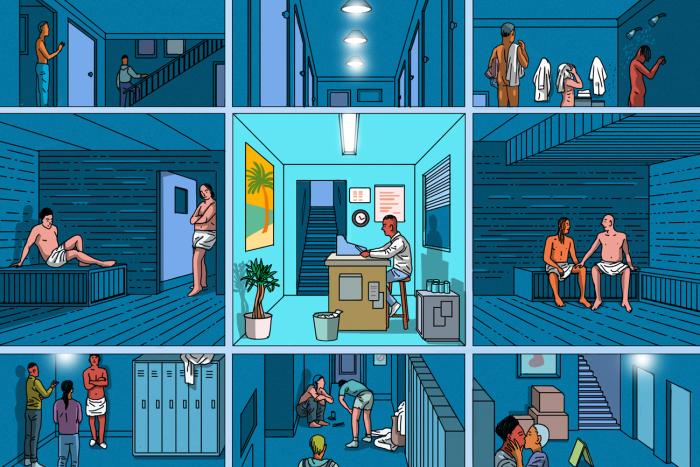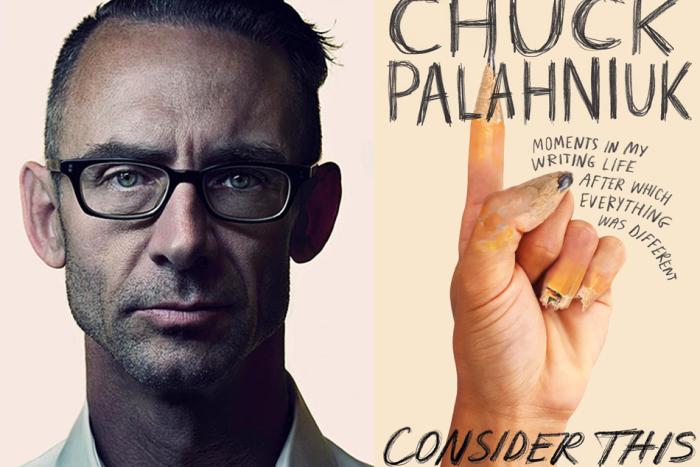In 2014, Anna Wiener was twenty-six years old, making a plush annual salary of $90,000 at a data analytics startup in Silicon Valley. And she was miserable.
Wiener once worked in publishing in New York. Uninspired by the direction of the publishing industry, she decided to make an unconventional move from the literary to the tech world—first at an ebook startup in NYC, and then venturing to the west coast—feeling a “relief to have joined a group that told itself it was superior, and a hedge against uncertainty, isolation, insecurity,” she writes in her debut memoir, Uncanny Valley (Farrar, Strauss and Giroux). But the move bore hidden costs. Wiener, a feminist, found herself navigating a misogynistic workplace culture, well-documented by figures such as Ellen Pao and Sarah Lacy. While brushing off comments about everything from her lips to her sex life, she realized that she had also failed to secure the same equity in the firm that her male colleagues enjoyed. Moreover, she began to feel uncomfortable with the way the company she worked for, which she tells me helped “enable the surveillance economy,” was tracking user behavior without their knowledge.
A writer at heart, Wiener often spun sympathetic narratives for the men in Silicon Valley who had essentially taken over the world, who she trusted to “tell me who I was, what mattered, how to live”—a situation that had become a “global affliction.” But after a few years working for them, she wised up: “I was looking for stories,” she writes. “I should have seen a system.”
I spoke to Wiener, who now covers tech culture for the New Yorker, on the phone from her apartment in San Francisco.
Hope Reese: You saw a “future” for yourself in tech that you didn’t see working in publishing. What did that look like?
Anna Wiener: I’d been an assistant for a few years, and it wasn’t clear what the path forward was for me. I was interviewing for jobs that were also assistant jobs. It just sort of felt like a slow-moving, dues-paying culture. It wasn’t that I wasn’t willing to do that, but I didn’t know what the end game was.
The decision was largely about looking at the jobs ahead of me in publishing and not being sure there was space for me, and falling backward into this publishing-adjacent startup and feeling like there was this whole world ahead of these guys. This whole industry with so much momentum, where people moved quickly. It felt like the opposite of publishing. But, in hindsight, there’s a reason publishing moves slowly. There’s a really different approach to output, and a different strategy in how you release work. But I was just looking around and trying to figure out what the future held for me.
For millennials, you write that “those who understood our cultural moment saw that selling out—corporate positions, partnerships, sponsors—would become our generation’s premier aspiration, the only way to get paid.” How much was money a factor in your decision to enter the tech world.
To clarify: I did not have student loans. I want to be really clear about the different privileges I had that made it possible to go into publishing in the first place. For me, it was a combination of things. It was a desire to feel useful and to feel valued. In my mid-twenties, without a ton of work experience, money was how people attached value to things. Going to a job with a higher salary, there was some feeling that I was doing things right. It’s a really dark and slippery slope, and fucked up, but at the time, I was looking for anything that would tell me I was doing something right.
When you arrived in San Francisco, you describe observing the huge wealth disparity. And the fact that certain people living with rent control were not those that rent control was intended for. What did it feel like to see this?
To observe the disparity and also understand that your presence is exacerbating it. It’s also a reflection of broader social ills and political failures. The narrative of blaming the homelessness crisis or the wider disparity on the tech industry is not the correct narrative—the tech industry has exacerbated and accelerated those problems, but they have very deep roots. Personally, I felt a lot of shame. I lived in the Haight, and there’s a lot of homelessness in the Haight, a lot of people slept in Golden Gate Park. I remember one night, we had leftover pizzas at the office, and I was stacking up pizzas to go to bring to the park, and a coworker said, “Wait! Don’t take the one with the prosciutto.” There was something that felt so horrible about that. You sort of have to laugh at that, because it’s so vile.
Your salary at twenty-six was $90,000 a year, and many people working with you made more than that. What was it like to have this money? Did it change you? Did it change people around you?
Money changes people. I wanted to be transparent about my own salaries and what my equity was worth, to show the stakes, but I also want to be clear that I was pretty low-ranking. There were people making six times my salary. I wouldn’t say that I’ve extricated myself from that. My jobs have changed but my circumstances are stable, and that comes from my background.
One of the things I found interesting in San Francisco in the last few years is the anticipation of this new money, how people are trying to build businesses or build real estate that appeals to this cohort. I had a lot of fun poking into open houses and seeing how they’re decorated. The lifestyle branding. I don’t know how many people enjoy that, but the aesthetics of this wealth are interesting to me. They’re somewhat self-denying, but decadent.
What’s interesting to me about the money is that a lot of people aren’t interested in material goods or art or philanthropy. A lot of it gets pumped back into the industry. It’s a running joke here about people becoming angel investors once they’ve had a windfall working for a company that’s IPO’d—everyone adds “angel investor” to their Twitter bio. It’s this aspirational thing, but it’s a sign of a moral value. It’s funny to me … it’s seen as philanthropic, but what you’re really doing is perpetuating the cycle, giving money to the same people.
Instead of specifically naming companies in your book, you call them things like, “the social network everyone hated.” Why did you choose to keep these companies anonymous?
I did that for stylistic reasons. I wanted to separate the companies from any associations readers might bring. The primary reason was that I don’t think it matters. They were all expressions or reflections of structural forces. In a lot of ways, these companies that I worked for could have been any company, and the executives could’ve been any people. It’s a highly specific world, but none of what happened to me was unusual. I also think the names are ridiculous. Isn’t it mortifying that a portmanteau like “Facebook” has geo-political clout? I think it’s obscene.
You worked at a data analytics startup. Can you talk about what, exactly, your company did?
It’s a huge, highly unregulated area. The company I worked for did product analytics. Software that can help other companies track how users are moving through their app or website. So, anything that you do on an app, any information that you input, anything you press or slide can be tracked and aggregated and analyzed. This company was helping other companies look at user-flows through product and also helping other companies understand exactly who those users were, and where they were coming from. Basically, helping other companies move through their product in such a way that whatever the end game was, which was revenue optimization, that they would get there faster or more frequently.
There’s another side of it, used for marketing. This was individualized. You could promote your product to a certain segment of users. If you want to reach people who are twenty-six, on an iPhone, active on the site between 2 and 6 a.m. and suggest they buy a gravity blanket. The company I worked for, at the time I worked there, only did aggregated reports for the companies they worked with. They didn’t sell data. But there were different ethical issues. The qualms I developed were that most people using apps or websites don't know that they're being tracked and don’t know that they're being tracked by a third party, and definitely don't know that they're being tracked by a third party whose employees potentially have access to that data. So, for me, it's more about this lack of transparency, or opacity, within the user experience where you have this imbalanced power dynamic and mediated experience in which the end user isn't even aware of what’s behind the scenes.
Would you consider it a digital surveillance firm? What does it have in common with, say, a company like Cambridge Analytica, that used user data to help sway the US election?
My answer is: Sort of. Or: Yes, but indirectly. The product facilitates surveillance, and helps companies collect information from users, often without users' knowledge. Data collection is almost always disclosed in a mature company's Terms of Service, but the names of any third-party tools that are doing the actual collection are not necessarily included. Basically, the company I worked for was a conduit, but I don't believe in neutral technology platforms; in my view the ethical issues of the company and product are inextricable from the broader landscape, and the behaviors they enable and normalize.
I think the two serve very different functions, but they are in the same ecosystem. Cambridge Analytica was a political consulting firm that harvested voter information and sold the promise of "psychographic profiles" that sourced demographic data from various places, e.g. Facebook. The company I worked for made a tool for collecting, aggregating, and analyzing user behavior. The "tool" also had a feature where you could see individual user activity within a customer's app, alongside their personal metadata, and send targeted content based on that information. That latter feature, which is called "People," strikes me as a pretty pure expression/outgrowth of surveillance capitalism.
In theory, the startup I worked for could have enabled its customers to engage in Cambridge Analytica-esque activity inside of their own platforms or apps, but the analytics startup itself did not build cross-platform profiles. I don't know what they would have done if a political campaign had an app or a website and wanted to use their tools; they probably wouldn't have paid it any mind, and I would assume that if the campaign was high-paying or high-profile enough, the company would assign it an account manager and have a paid employee helping the campaign optimize their products and outreach.
More realistically, there's also no way for me, or anyone, to know what our customers did with the data they collected on their own users. It's possible they could have sold it or integrated it with other data sets. I don't know, and don't want to speculate too much.
You call yourself a “self-identified feminist in a position of ceaseless professionalized deference to the male ego.” How did you handle this?
I’m embarrassed about it, looking back. I’m a little ashamed about the way that I was so deferential and did my best to normalize everything that was happening, and even participated in it. I tried to erase myself. I wouldn’t say that that’s a brilliant coping strategy, but I really wanted to be a part of something. That meant that I was consumed by this thing.
As someone who was a non-technical employee at a pretty low level, who felt really grateful to be included, it was what I needed to do. I think that if there was someone who was a senior technical woman with experience and credentials, who had already been affirmed by an industry, she might've had an easier time with it. But to be honest, I'm just thinking about other people that I've encountered that do fit that criteria, but I don't know that they were given the credit that they deserved either.
It sort of led to a complete dissociation from who I knew myself to be. I own my mistakes.
You write that “the tech industry was making you a perfect consumer of the world that it was creating,” and describe about going down these rabbit holes online, as most of us do. When did you start noticing the problem with this?
I felt it. I had this job, I was working remotely, I mostly worked from my apartment and I had these days when the day would be over, I'd be done with work, it'd be 7 p.m., and I would just feel so bad for myself. I wouldn't be able to account for how I spent my time or what I had learned that day, or what I had even produced. Working customer support is sort of like, the tide comes in and the tide goes out. It doesn't really build into anything, for the most part.
My browser history was just this appalling record of someone wasting their life. It was more a sensation, a building feeling of dread and anxiety, and feeling like I had chosen a profession where I was, potentially, perpetuating that cycle. Ironically, I’m now in another profession that requires that I be on the internet quite a bit. I write about the tech industry, and a lot of things that happen in the tech industry bubble up on social media. I’m still hanging out in these spaces more than I wish I did, but I don’t know very many people in tech who manage to avoid spending a lot of time on the internet.
At the end of the book, you write that you were “looking for stories and you should have seen a system.” Can you explain what you mean by that?
I have always been very focused on personal narratives and personal ambitions and justifications and psychological motivations that people have. But actually, what I should have been looking at was the structure—not working on such a micro level. For my own understanding of this world and why things are happening the way they were.
I have a friend, Moira Weigel, who is also a writer, and we were having a conversation about Mark Zuckerberg, who she had gone to college with. She's just sort of threw her arms up and said, “if he didn't exist, the internet would have invented him.” That encapsulates what I mean by it.
Mark Zuckerberg doesn’t matter. The people that I worked for don't matter. In terms of their individual intentions or motivations, good or bad. I think that even people with the best intentions, who think they can push against this industry, are running up against the same problems with people who are succeeding, who wouldn’t see them as problems.
I think structural analysis can be very forgiving, if that makes sense. I would’ve had an easier time, even in my own life, if I hadn’t been so focused on the individual narrative.
But isn’t it partly a writer’s instinct to do that?
Yes, and the industry relies on good storytelling. The industry has told these stories about itself. The biggest strengths are marketing, branding, packaging. Part of what was compelling to me about working at the analytics company was that data is a kind of storytelling. Looking at data in aggregate is fascinating, it’s about how people are living their lives, even if it’s how they live their lives online. I wouldn’t say this isn’t a world with a lot of storytelling. But I think, for me, zooming out would’ve eased the burden of trying to understand this world.
You mentioned to me earlier that when you moved to the West Coast it was because you didn’t know what your end game was. Do you know what it is now?
I’ve always had a very hard time picturing the future. I try not to do it. I remember having a conversation with my manager at the analytics company, and we were trying to figure out what my job should be. He said, “Where do you see yourself in five or 10 years?” Classic question. As a working professional, you should have an answer to that question, even if it's bullshit. And I was very honest and I said, “I don't really know.” And he said, “You could start a company!”
I think the fact that that's the end game, that’s the most valuable thing a person can do in this world, is part of the problem. I don't see myself starting a company anytime soon. I have really enjoyed writing. It took me a long time to admit it was something I wanted to do. This book is an admission of that.






